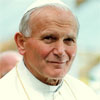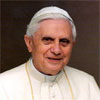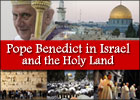Benedict XVI's preparations for his trip to the Holy Land are under way, as he himself confirmed today in a meeting with a Jewish delegation from the United States (Zenit News, February 14, 2009):
According to sources from both Jerusalem and Rome, the Holy Father's first pilgrimage to Israel and the surrounding region will take place during the second week of May.
He confirmed his intention to make the visit, despite doubts cast on the plan by the conflict in Gaza and the scandal caused by Lefebvrite Bishop Richard Williamson.
Rabbi Arthur Schneier of New York told the Pontiff, "The promised land awaits your arrival."
And noting that his guests were scheduled to visit the Holy Land after their time in Italy, Benedict XVI said: "I too am preparing to visit Israel, a land which is holy for Christians as well as Jews, since the roots of our faith are to be found there.
"Indeed, the Church draws its sustenance from the root of that good olive tree, the people of Israel, onto which have been grafted the wild olive branches of the Gentiles. From the earliest days of Christianity, our identity and every aspect of our life and worship have been intimately bound up with the ancient religion of our fathers in faith."

Pope Benedict XVI and Cardinal Walter Kasper (centre L), pose during an audience with a delegation from the Conference of Presidents of Major American Jewish Organisations at the Vatican. Photo credit: Reuters
Click here for the full text of Pope Benedict XVI's address to the Conference of Presidents of Major American Jewish Organizations -- in which the Holy Father recalled his meeting the Jewish community at Cologne (making history as the first Pope to visit a synagogue in Germany), in August 2005; his visit to the extermination camp at Auschwitz-Birkenau in May 2006, his meeting with Rabbi Schneier and congregation of the Park East Synagogue in New York during his 2008 visit to the United States.
Chiefly, Pope Benedict recalled the importance of recognizing the Shoah (alluding to the recent controversy involving SSPX Bishop Richard Williamson):
The two-thousand-year history of the relationship between Judaism and the Church has passed through many different phases, some of them painful to recall. Now that we are able to meet in a spirit of reconciliation, we must not allow past difficulties to hold us back from extending to one another the hand of friendship. Indeed, what family is there that has not been troubled by tensions of one kind or another? The Second Vatican Council’s Declaration "Nostra Aetate" marked a milestone in the journey towards reconciliation, and clearly outlined the principles that have governed the Church’s approach to Christian-Jewish relations ever since.
The Church is profoundly and irrevocably committed to reject all anti-Semitism and to continue to build good and lasting relations between our two communities. If there is one particular image which encapsulates this commitment, it is the moment when my beloved predecessor Pope John Paul II stood at the Western Wall in Jerusalem, pleading for God’s forgiveness after all the injustice that the Jewish people have had to suffer. I now make his prayer my own: "God of our fathers, you chose Abraham and his descendants to bring your Name to the Nations: we are deeply saddened by the behaviour of those who in the course of history have caused these children of yours to suffer, and asking your forgiveness we wish to commit ourselves to genuine brotherhood with the people of the Covenant" (26 March 2000).
The hatred and contempt for men, women and children that was manifested in the Shoah was a crime against God and against humanity. This should be clear to everyone, especially to those standing in the tradition of the Holy Scriptures, according to which every human being is created in the image and likeness of God (Gen 1:26-27). It is beyond question that any denial or minimization of this terrible crime is intolerable and altogether unacceptable. Recently, in a public audience, I reaffirmed that the Shoah must be "a warning for all against forgetfulness, denial or reductionism, because violence committed against one single human being is violence against all" (January 28, 2009).
This terrible chapter in our history must never be forgotten. Remembrance – it is rightly said – is "memoria futuri", a warning to us for the future, and a summons to strive for reconciliation. To remember is to do everything in our power to prevent any recurrence of such a catastrophe within the human family by building bridges of lasting friendship. It is my fervent prayer that the memory of this appalling crime will strengthen our determination to heal the wounds that for too long have sullied relations between Christians and Jews. It is my heartfelt desire that the friendship we now enjoy will grow ever stronger, so that the Church’s irrevocable commitment to respectful and harmonious relations with the people of the Covenant will bear fruit in abundance.










